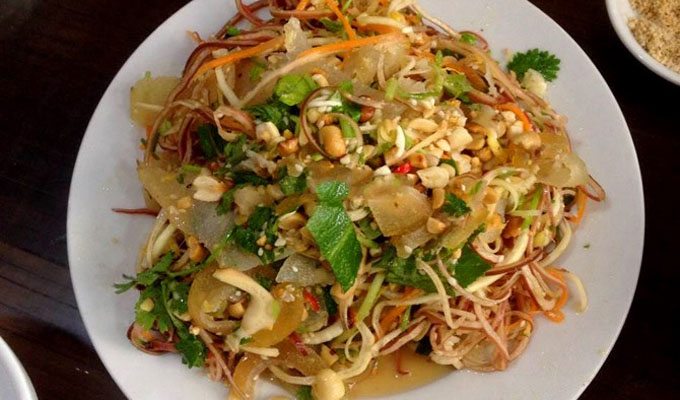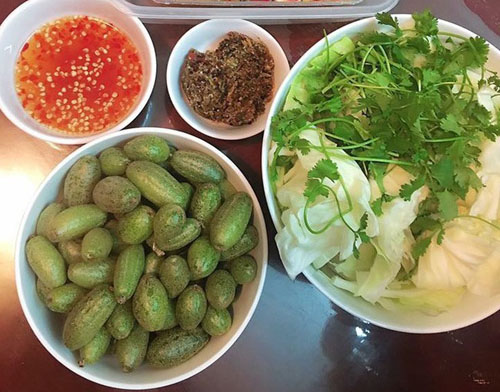Nom da trau (buffalo skin salad) and nhot xanh cuon bap cai (green elaeagnus latifolia) wrapped in cabbage, are unique and tasty specialties of the ethnic Thai group in the northwestern province of Son La.
Nom da trau (buffalo skin salad )
I was lucky to be make the dish with my sister-in-law’s mother, Nong Thi Huyen, who is from Son La. She prepares the salad only for dear guests.

Huyen said in the lowlands, buffalo skin was used to make drum covers because it was hard and thick, but Thai housewives knew how to turn it into a culinary specialty.
She warned me that the process to make the dish was complicated, but worth the effort.
First the leather is held over a fire to burn all the hair off. Then it is scraped of the outer black skin until it becomes light.
Huyen told me to boil the skin for an hour before soaking it in cold water for another hour to ensure it becomes crispy.
The most difficult part is cutting the skin. It takes a sharp knife and skill to slice off thin pieces and soak them in warm water mixed with lemon juice to make it soft and fragrant.
She then soaked the slices for an hour with special spices from the northwestern forests, such as tram trang (canarium album), garlic, water from fermented bamboo shoots and mac khen (a special fruit used to make spice among the Thai) before mixing fresh rau don (forest vegetable) and banana inflorescense and covering it with fried ground nuts.
If I hadn’t seen the process first-hand, I could never imagine that the tender dish was made from such hard skin. All my family members, including my two grandchildren, enjoyed it so much. “I could eat the whole plate,” said one.
I loved the salad’s aromatic mac khen flavour, the light sourness of fermented bamboo shoots, the acrid and bittersweet flavour of forest vegetables and the rich taste of fried groundnut.
Nhot xanh cuon bap cai (green elaeagnus latifolia wrapped in cabbage)

Like the salad buffalo skin, this dish is also a special treat of the Thai people.
A Thai elder, named Hoang Thi Ho, said the main ingredient was green nhot fruit.
Another vital ingredient is cham cheo (a special salt made by the Thai people), which includes garlic, ginger, chili, and coriander sativum. The ingredients are crushed before being mixed with several spoonfuls of fish sauce and sugar.
Ho said each eater serves his or herself by cutting the fruit into pieces and then wrapping them and other above-mentioned ingredients in a piece of cabbage.
“It will be much more enjoyable when dipped in the cham cheo sauce,” said Ho, noting that the dish was always eaten with friends because talking and joking were considered another spice to add to the dish.
“Our traditional dish helps to promote sentiment and solidarity among family members and guests. We Thais place most importance on this,” said Ho.
Hanoian Phung Thi Trang said young urban people love the dish so much. “We visit Son La once a year when the nhot fruit season comes in the third and fourth lunar months.”
Local Thai herbalist Lo Van Chu, 77, said the dish had existed for hundreds of years and had been passed down over generations. “The dish not only helps eaters create good appetitites, but also cools down the body and treats many ailments such as diarrorhea and sunstroke.